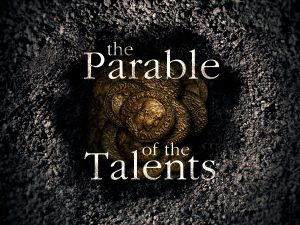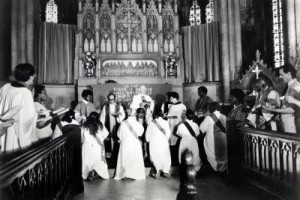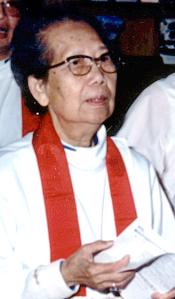From the Book of Judges:
Then the Israelites did what was evil in the sight of the Lord and worshiped the Baals; and they abandoned the Lord, the God of their ancestors, who had brought them out of the land of Egypt; they followed other gods, from among the gods of the peoples who were all around them, and bowed down to them; and they provoked the Lord to anger. They abandoned the Lord, and worshiped Baal and the Astartes. So the anger of the Lord was kindled against Israel, and he gave them over to plunderers who plundered them, and he sold them into the power of their enemies all around, so that they could no longer withstand their enemies. Whenever they marched out, the hand of the Lord was against them to bring misfortune, as the Lord had warned them and sworn to them; and they were in great distress.
(From the Daily Office Lectionary – Judges 2:11-15 (NRSV) – July 29, 2014)
 My usual Sunday afternoon occupation, after presiding and preaching at church and making any needed pastoral calls, is reading the online edition of the New York Times, which is what I did Sunday. Among the many items that got my attention was a very short report on some economic statistics, specifically on the fact that the net worth of the typical American family has decreased by more than a third over the last decade: “The inflation-adjusted net worth for the typical household was $87,992 in 2003. Ten years later, it was only $56,335, or a 36 percent decline, according to a study financed by the Russell Sage Foundation.” (The Typical Household)
My usual Sunday afternoon occupation, after presiding and preaching at church and making any needed pastoral calls, is reading the online edition of the New York Times, which is what I did Sunday. Among the many items that got my attention was a very short report on some economic statistics, specifically on the fact that the net worth of the typical American family has decreased by more than a third over the last decade: “The inflation-adjusted net worth for the typical household was $87,992 in 2003. Ten years later, it was only $56,335, or a 36 percent decline, according to a study financed by the Russell Sage Foundation.” (The Typical Household)
What happened during that decade, of course, was the so-called “housing bubble,” the debt default crisis, the packaging of sub-prime mortgages into derivative investments, the Great Recession, the bank bail-out, and a significant increase in student debt (made non-dischargeable in bankruptcy by a Congress which also refused to find ways to lower the interest rate on such loans). Typical Americans saw their biggest asset (the family home) substantially reduced in value while their indebtedness increased. Of course their net worth went down! I don’t want to believe that Americans have been given “over to plunderers who plundered them,” but Americans certainly are “in great distress.”
In fact, as I am writing this, I just received an email from Bill Moyers (a subscription service, of course; Bill Moyers doesn’t write to me personally) with this tidbit: “50% of jobs in the US pay less than $34,000 a year. And 25% of jobs in the US pay below the poverty line for a family of four: less than $23,000 annually.”
Now, in truth, I’m not the sort who believes that God hands people over to plunderers or sells “them into the power of their enemies all around.” That’s an ancient way to understand the law of cause and effect (and, perhaps, the law of unintended consequences), but as a metaphor for how the world works . . . it works for me. Especially if the metaphor makes us give thought to what “Baals and Astartes” we may be worshiping and with what consequent effect.
With the Times’ report still in my memory, I turned on NPR in my car as I went to make a call early yesterday afternoon and one of their many news and commentary programs were on — I think it may have been “The World.” The subject under discussion was the announced acquisition of the Family Dollar grocery chain by its “extreme value” competitor, Dollar Tree. The reporter was interviewing a stock market analyst, a specialist in retail commerce stocks, about the merger, asking if the analyst thought it was a wise move by Dollar Tree.
The analyst was just gushing about what a great deal this was and why stocks of “extreme value” retailers (it was from him I learned this term) are such a good buy for an investor. His basic reason: the number of people below the poverty line has doubled in the last decade! The number of poverty level households in the United States has gone from one-in-twelve to one-in-six. People living in such families are the natural market for “extreme value” retailers, so their market share has increased. They are poised, he said, “to make a killing!”
I was flabbergasted! I’d never heard anyone so overjoyed that more Americans are living in destitution, that so many of his fellow citizens are in need. He was, in essence, say, “A lot of people can’t afford good products, so the wealthy should invest in the stores that sell them substandard crap. Lots of money to be made there.” Isn’t that like saying, “The cattle are dying; invest in vultures”? Or (to use our bible metaphor today), “God is handing them over to be plundered; invest in the plunderers! God is selling them to their enemy; invest in the enemy!”
Who or what are the “Baals and Atartes” this society worships? Who are the “plunderers” to whom we are given over to be plundered? On what altars are we sacrificing and what is it we are offering?
On one level, this is just economics. The part of me that went to business school and has an MBA wants to say, “That’s just the way markets work.” But another part of me must respond, “But that’s just unacceptable.” And I remember Someone who said, “No one can serve two masters; for a slave will either hate the one and love the other, or be devoted to the one and despise the other. You cannot serve God and wealth.” (Mt 6:24, NRSV)
====================
A request to my readers: I’m trying to build the readership of this blog and I’d very much appreciate your help in doing so. If you find something here that is of value, please share it with others. If you are on Facebook, “like” the posts on your page so others can see them. If you are following me on Twitter, please “retweet” the notices of these meditations. If you have a blog of your own, please include mine in your links (a favor I will gladly reciprocate). Many thanks!
====================
Father Funston is the rector of St. Paul’s Episcopal Church, Medina, Ohio.

 This morning, I woke up from a dream, grabbed the notepad on my nightstand, and scribbled some notes for a poem.
This morning, I woke up from a dream, grabbed the notepad on my nightstand, and scribbled some notes for a poem.  My usual Sunday afternoon occupation, after presiding and preaching at church and making any needed pastoral calls, is reading the online edition of the New York Times, which is what I did Sunday. Among the many items that got my attention was a very short report on some economic statistics, specifically on the fact that the net worth of the typical American family has decreased by more than a third over the last decade: “The inflation-adjusted net worth for the typical household was $87,992 in 2003. Ten years later, it was only $56,335, or a 36 percent decline, according to a study financed by the Russell Sage Foundation.” (
My usual Sunday afternoon occupation, after presiding and preaching at church and making any needed pastoral calls, is reading the online edition of the New York Times, which is what I did Sunday. Among the many items that got my attention was a very short report on some economic statistics, specifically on the fact that the net worth of the typical American family has decreased by more than a third over the last decade: “The inflation-adjusted net worth for the typical household was $87,992 in 2003. Ten years later, it was only $56,335, or a 36 percent decline, according to a study financed by the Russell Sage Foundation.” ( The parable of the bridesmaids has always bothered me. Whenever I have to preach from it I have to get passed my first reaction, which is, “Really? People will be kept out of heaven for being stupid?” Of course, that is a misreading, or perhaps I should say “over-reading,” of the metaphor.
The parable of the bridesmaids has always bothered me. Whenever I have to preach from it I have to get passed my first reaction, which is, “Really? People will be kept out of heaven for being stupid?” Of course, that is a misreading, or perhaps I should say “over-reading,” of the metaphor. It may be a sign of my age or a condemnation of my cultural up-bringing, but I cannot read any of the story of Samson and Delilah without hearing Tom Jones’ voice sining, “Why? Why? Why, Delilah? My, my, my Delilah?” Silly, I know, but it sort of fits with this bit from the Old Testament lesson from today’s lectionary readings.
It may be a sign of my age or a condemnation of my cultural up-bringing, but I cannot read any of the story of Samson and Delilah without hearing Tom Jones’ voice sining, “Why? Why? Why, Delilah? My, my, my Delilah?” Silly, I know, but it sort of fits with this bit from the Old Testament lesson from today’s lectionary readings. OK. I know I shouldn’t get into this . . . I know that someone is going to give me a hard time; I can almost predict that someone will tell me they are planning to “leave the church” over this. But here goes.
OK. I know I shouldn’t get into this . . . I know that someone is going to give me a hard time; I can almost predict that someone will tell me they are planning to “leave the church” over this. But here goes.  It is intriguing how often in stories of Holy Scripture food plays a role. From the “apple” in the Garden, to Abraham offering a meal of cakes and meat to the three men (who turn out to God) at the Oaks of Mamre, to this story of Gideon, to David and his men eating the Bread of the Presence, to all the food items listed as items of sacrifice in Leviticus, the Old Testament (indeed, the whole Bible) is food focused. The People of God define themselves through the annual reenactment of a ritual meal celebrating the Passover; the new People of God define themselves (in my tradition and others) by the weekly reenactment of a ritual meal celebrating the death and Resurrection of Christ and anticipating his return. It’s intriguing but not surprising. The Jewish and Christian faiths are not, in the long run, about following rules of ritual or moral conduct; they are about being in an intimate relationship with that which is the source of being, that which we call “God” and address as “Father” or brother or redeemer. And, other than sex, there is probably no more intimate activity two or more people can share than eating together.
It is intriguing how often in stories of Holy Scripture food plays a role. From the “apple” in the Garden, to Abraham offering a meal of cakes and meat to the three men (who turn out to God) at the Oaks of Mamre, to this story of Gideon, to David and his men eating the Bread of the Presence, to all the food items listed as items of sacrifice in Leviticus, the Old Testament (indeed, the whole Bible) is food focused. The People of God define themselves through the annual reenactment of a ritual meal celebrating the Passover; the new People of God define themselves (in my tradition and others) by the weekly reenactment of a ritual meal celebrating the death and Resurrection of Christ and anticipating his return. It’s intriguing but not surprising. The Jewish and Christian faiths are not, in the long run, about following rules of ritual or moral conduct; they are about being in an intimate relationship with that which is the source of being, that which we call “God” and address as “Father” or brother or redeemer. And, other than sex, there is probably no more intimate activity two or more people can share than eating together. “Most blessed” be a murderess? What is this? Yesterday, a friend and colleague who was only a little older than I am passed away after several months of pancreatic cancer, so I’m a little sensitive on the subject of death this morning. So, really! What is this?
“Most blessed” be a murderess? What is this? Yesterday, a friend and colleague who was only a little older than I am passed away after several months of pancreatic cancer, so I’m a little sensitive on the subject of death this morning. So, really! What is this?  This past Sunday, the Episcopal Church marked the 28th anniversary of the women known as “the Philadelphia Eleven” who were ordained on July 29, 1974. Four retired bishops (Daniel Corrigan, Robert DeWitt, Edward Welles and George Barrett) chose to defy the General Convention of the Episcopal Church which, at its regular triennial meeting in 1973, had voted against opening the priesthood to women; women were already eligible for ordination as deacons. Joined by male presbyters who supported them and the candidates, they ordained eleven women deacons to the priesthood: Merrill Bittner, Alla Bozarth-Campbell, Alison Cheek, Emily Hewitt, Carter Heyward, Suzanne Hiatt, Marie Moorefield Fleisher, Jeannette Piccard, Betty Bone Schiess, Katrina Martha Swanson, and Nancy Hatch Wittig. Shortly thereafter, four additional women were also “irregularly” ordained: Eleanor Lee McGee, Alison Palmer, Betty Powell, and Diane Tickell. A firestorm of controversy erupted in the church: charges were filed against these dissident bishops (Daniel Corrigan, Robert DeWitt, Edward Welles and George Barrett) and an emergency meeting of the Episcopal House of Bishops was convened on August 15, 1974.
This past Sunday, the Episcopal Church marked the 28th anniversary of the women known as “the Philadelphia Eleven” who were ordained on July 29, 1974. Four retired bishops (Daniel Corrigan, Robert DeWitt, Edward Welles and George Barrett) chose to defy the General Convention of the Episcopal Church which, at its regular triennial meeting in 1973, had voted against opening the priesthood to women; women were already eligible for ordination as deacons. Joined by male presbyters who supported them and the candidates, they ordained eleven women deacons to the priesthood: Merrill Bittner, Alla Bozarth-Campbell, Alison Cheek, Emily Hewitt, Carter Heyward, Suzanne Hiatt, Marie Moorefield Fleisher, Jeannette Piccard, Betty Bone Schiess, Katrina Martha Swanson, and Nancy Hatch Wittig. Shortly thereafter, four additional women were also “irregularly” ordained: Eleanor Lee McGee, Alison Palmer, Betty Powell, and Diane Tickell. A firestorm of controversy erupted in the church: charges were filed against these dissident bishops (Daniel Corrigan, Robert DeWitt, Edward Welles and George Barrett) and an emergency meeting of the Episcopal House of Bishops was convened on August 15, 1974. These women were not the first to be ordained to the Anglican priesthood, however. During the Second World War, Florence Li Tim-Oi was ordained to the presbyterate on January 25, 1944, by the Rt. Rev. Ronald Hall, Bishop of Hong Kong, in response to the crisis among Anglican Christians in China caused by the Japanese invasion. No male clergy could be found who were willing to take on the onerous ministry, but Ms. Li was, so she was ordained and served with distinction. After the war, the Archbishop of Canterbury sought to make the bishop and the priest rescind the ordination, but neither did. Ms. Li voluntarily ceased serving as a priest until more than 30 years later when she immigrated to Canada where the Anglican Church, following the Episcopal Church’s lead, had begun to ordain women. Her priesthood was recognized and she served as an honorary canon in Toronto, ministering among the immigrant Chinese population.
These women were not the first to be ordained to the Anglican priesthood, however. During the Second World War, Florence Li Tim-Oi was ordained to the presbyterate on January 25, 1944, by the Rt. Rev. Ronald Hall, Bishop of Hong Kong, in response to the crisis among Anglican Christians in China caused by the Japanese invasion. No male clergy could be found who were willing to take on the onerous ministry, but Ms. Li was, so she was ordained and served with distinction. After the war, the Archbishop of Canterbury sought to make the bishop and the priest rescind the ordination, but neither did. Ms. Li voluntarily ceased serving as a priest until more than 30 years later when she immigrated to Canada where the Anglican Church, following the Episcopal Church’s lead, had begun to ordain women. Her priesthood was recognized and she served as an honorary canon in Toronto, ministering among the immigrant Chinese population.

